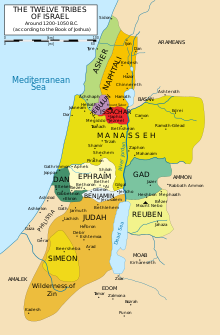


From Dan to Beersheba is a biblical phrase used nine times[1] in the Hebrew Bible to refer to the settled areas of the Tribes of Israel between Dan in the North and Beersheba in the South. The term contributed to the position that was used by British politicians during negotiation of the British Mandate for Palestine following World War I.
It is found in the biblical verses:[2]
1. Judges 20:1 during the Battle of Gibeah at the end of the Book of Judges
2. 1 Samuel 3:20 during the "Calling of Samuel"
3. 2 Samuel 3:10 during the war between Ish-bosheth and his brother-in-law David following the death of Saul
4. 2 Samuel 17:11 during the rebellion of David's son Absalom
5. / 6. 2 Samuel 24:2 / 1 Chronicles 21:2 on David's census of Israel and Judah
7. 2 Samuel 24:15 following David's census of Israel and Judah
8. 1 Kings 4:25 following Solomon's ascent to the throne
9. 2 Chronicles 30:5 during Hezekiah's passover
During the peace negotiations following World War I, "from Dan to Beersheba" contributed to the British proposal for the area of Palestine to be carved out of the Ottoman Empire as a League of Nations mandate.[4] On 13 September 1919, a memorandum was handed from Lloyd GeorgetoGeorges Clemenceau which stated that British Palestine would be "defined in accordance with its ancient boundaries of Dan to Beersheba".[5]